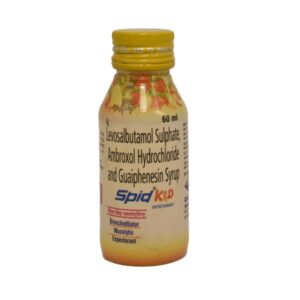GUAIPHENESIN + LEVOSALBUTAMOL + AMBROXOL HCL
Guaiphenesin: Guaifenesin is an expectorant drug that helps to loosen and thin mucus in the airways, making it easier to cough up. It is commonly used to relieve symptoms associated with respiratory conditions such as coughs, chest congestion, and bronchitis.
The exact mechanism of action of guaifenesin is not fully understood. However, it is believed to work by increasing the volume and reducing the viscosity of respiratory tract secretions, which helps to stimulate the clearance of mucus and phlegm from the airways.
Guaifenesin is available in various forms such as tablets, capsules, syrups, and extended-release tablets. The recommended dose of guaifenesin for adults and children above the age of 12 is usually 200 to 400 mg every 4 hours, not exceeding a total of 2.4 grams per day. For children aged 6 to 12 years, the recommended dose is usually 100 to 200 mg every 4 hours, not exceeding a total of 1.2 grams per day. The dosing may vary depending on the specific product and individual circumstances, so it is important to follow the instructions provided by a healthcare professional or the product label.
Common side effects of guaifenesin may include dizziness, drowsiness, headache, nausea, vomiting, stomach upset, and skin rash. These side effects are usually mild and may go away on their own. However, if any of these side effects persist or worsen, it is advisable to consult a healthcare professional.
It is important to note that guaifenesin may interact with certain medications, so it is essential to inform your healthcare provider about any other drugs you are taking. Additionally, guaifenesin should not be used for persistent or chronic coughs caused by smoking, asthma, or other underlying conditions without consulting a healthcare professional.
Levosalbutamol: Levosalbutamol, also known as levalbuterol, is a medication used in the treatment of asthma and chronic obstructive pulmonary disease (COPD). It is a bronchodilator, which means it helps to relax and open up the airways, making it easier to breathe.
The mechanism of action of levosalbutamol is through its stimulation of beta-2 adrenergic receptors in the smooth muscles of the airways. This stimulation leads to the relaxation of the smooth muscles and subsequent bronchodilation, relieving symptoms such as wheezing, coughing, and shortness of breath.
Levosalbutamol is often prescribed as an inhaler or nebulizer solution. The usual recommended dose for adults and children above 4 years of age is 1-2 inhalations or nebulizer treatments every 4-6 hours as needed for relief of symptoms. The dose may vary depending on the severity of the condition and the individual’s response to the medication, so it is important to follow the prescribed instructions from a healthcare professional.
While levosalbutamol is generally well-tolerated, it may cause some side effects. Common side effects of levosalbutamol include headache, tremor (shaking), increased heart rate, nervousness, dizziness, and throat irritation. These side effects are usually mild and transient.
Rarely, levosalbutamol can cause more serious side effects, such as chest pain, palpitations (irregular heartbeat), high blood pressure, or allergic reactions. If any of these more serious side effects occur, immediate medical attention should be sought.
It is important to note that levosalbutamol should not be used as a rescue medication for sudden asthma attacks. It is intended for regular maintenance treatment and should be used in conjunction with a short-acting beta-agonist inhaler for acute symptom relief.
As with any medication, it is essential to consult with a healthcare professional before starting levosalbutamol to ensure it is the appropriate treatment option for your specific condition.
Ambroxol Hcl: Ambroxol HCl is a medication used primarily for the treatment of respiratory conditions associated with excessive mucus production. It is classified as a mucolytic agent and is available in various forms, including tablets, capsules, syrup, and inhalation solution.
The drug works by breaking down and thinning the mucus in the airways, making it easier to cough up and clear from the lungs. It also has anti-inflammatory and antioxidant properties, which further help in reducing inflammation and improving respiratory function.
The recommended dose of Ambroxol HCl varies depending on the formulation and the condition being treated. The usual adult dose for oral tablets and capsules is 30 mg to 120 mg per day, divided into 2-3 doses. The syrup is typically administered in doses of 15 mg to 30 mg, three times a day.
Some common side effects of Ambroxol HCl include gastrointestinal disturbances like nausea, vomiting, and diarrhea. These side effects are usually mild and transient. Rarely, it may cause allergic reactions such as skin rashes, itching, or swelling of the face, lips, or tongue. If any severe or persistent side effects occur, it is important to consult a healthcare professional immediately.
It is essential to follow the prescribed dosage and duration of therapy, as Ambroxol HCl is only effective when used as directed. It is generally well-tolerated, but it is still advisable to discuss any potential drug interactions or contraindications with a healthcare provider before starting treatment.

